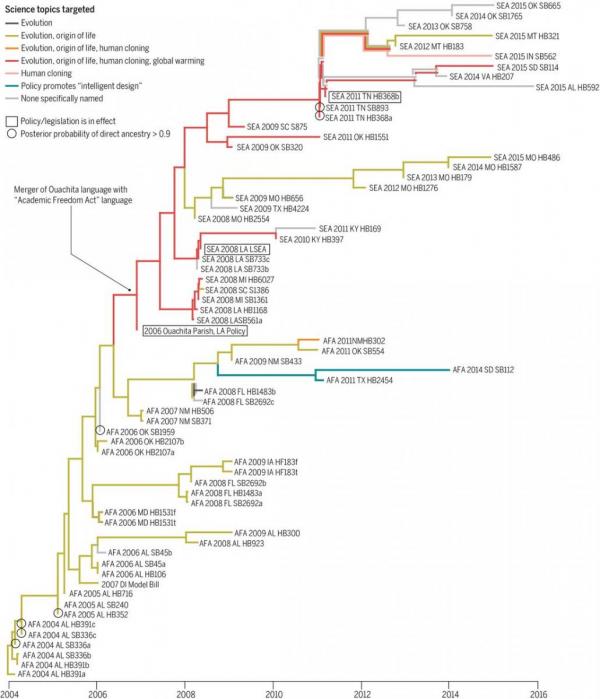Since December 2005, when Judge John E. Jones III ruled that “intelligent design” is not science and cannot be forced into public school science classes, we’ve celebrated December 20 as Kitzmas. We write carols (and haikus). But we’ve never really had a Kitzmas tree before.
That all changes this year, for the tenth Kitzmas. Today, Science released a prepublication version of “The evolution of antievolution policies since Kitzmiller v. Dover” by former NCSE staffer Nick Matzke, in which he analyzed NCSE’s database of “academic freedom” legislation—the successor strategy to “intelligent design.” And by applying the fancypants evolutionary analysis he learned while getting his post-NCSE PhD, he came up with this tree.
 Figure 1 from Matzke's phylomemetic analysis of creationist legislation. His caption explains: "The nodes (splitting events) represent copying events. The distance between a tip and a node is an inference about how much change occurred and how much time this took. When the node-to-tip distance is effectively zero, this indicates a high probability of direct ancestry. Tip labels indicate [which kind of bill this represents] year, state, bill number (SB, senate bill; HB, house bill), and versions (a, b, or c, for legislative revisions; t or f, teachers or faculty targeted)."
Figure 1 from Matzke's phylomemetic analysis of creationist legislation. His caption explains: "The nodes (splitting events) represent copying events. The distance between a tip and a node is an inference about how much change occurred and how much time this took. When the node-to-tip distance is effectively zero, this indicates a high probability of direct ancestry. Tip labels indicate [which kind of bill this represents] year, state, bill number (SB, senate bill; HB, house bill), and versions (a, b, or c, for legislative revisions; t or f, teachers or faculty targeted)."It’s hard to know exactly where to put the star on top, and the packages beneath tend to be unwelcome when opened, but, still, what a tree!
As the tree shows, the first of these bills originated before the 2005 trial sounded a death knell for “intelligent design” creationism. The Discovery Institute, the institutional home of ID creationism, started promoting model legislation of this form in 2007, but Matzke’s analysis was able to date that text based on the other bills and concluded that the DI text was actually written earlier. Maybe their staff were even sitting in the back of the courtroom in Pennsylvania making hasty revisions as they watched the legs fall off their hobbyhorse.
The analysis also shows that the ID camp couldn’t keep control of their new strategy. Shortly after publishing the model legislation (as part of the promotion for Ben Stein’s Expelled), it went through a rapid evolution. As Matzke’s tree shows, the legislation merged with a school district policy from Ouachita Parish, Louisiana, producing the first such bill to become law. That new language—and the merger—was shepherded by the Louisiana Family Forum (an affiliate of the radical religious rightwing group Focus on the Family and the hate group Family Research Council). Since then, that modified language has proven quite successful, while bills hewing closer to the DI model have withered on the vine. In Tennessee, the only other state to actually pass such a bill, the legislation was also promoted heavily by the state’s affiliate of Focus on the Family, with the DI largely watching from the sidelines.
And the bills’ focus on evolution has slipped as well. Where the original Alabama bills singled out evolution and the origin of life (or “chemical evolution” in some cases), the merger with the Ouachita Parish policy brought climate change and “human cloning” into the fold (the latter is a coded reference to stem cell research). Since that merger, more and more of the bills have either dropped all reference to specific topics, or have dropped their reference to evolution. A bill in Kansas in 2013 referred only to climate change, while one in Indiana this year only addressed human cloning. The bills are still harmful, letting denialist materials into classrooms, preventing teachers from reining in students who interrupt with denialist claims, and stopping administrators from disciplining teachers who attack the science in the classroom.
That diffusion of the bills’ focus can’t have them dancing at the Disco. ‘tute’s headquarters, but it’s even worse news for science education. Singling out evolution is problematic, of course, but so is singling out climate change, medical research, or even science classes in general. Science teachers don’t need academic freedom to be redefined, and schools don’t need different rules for different subjects. NCSE has fought these bills steadfastly, defeating almost 60 of them, and continuing to work for repeal of the two that passed. As we near the tenth Kitzmas, here’s hoping that Matzke’s tree stays as small and bedraggled as Charlie Brown’s infamous holiday decoration.

